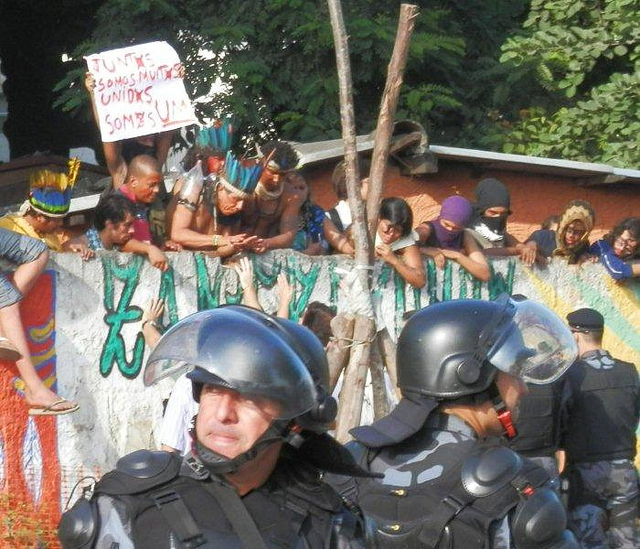Solidarity with the Indigenous in their Fight in Mato Grosso do Sul
The MST expresses solidarity with the indigenous fighting in Mato Gross o do Sul in defending their territories and against the appropriation of land by agribusiness.
o do Sul in defending their territories and against the appropriation of land by agribusiness.
The Brazilian state, with the decision to expel the indigenous from the Buriti Fazenda and Federal Police action to repossess the occupied land in the municipality of Sidrolândia, acts to defend the right of agribusiness and large farmers, instead of fulfilling what is required by the Constitution.
The federal government gives priority to serving the interests of agribusiness, which threatens the life of the peasants, indigenous, quilombolas [Afro-Brazilian communities] and traditional peoples. The failure of the state before the death of the indigenous in struggle reveals the insensitivity of the authorities.
Agribusiness, while the dominant model of organization of agriculture and the rural environment in Brazil, is sustained by an alliance of capitalist farmers with transnational corporations, that advances in order to control our lands and agricultural production.
Policies implemented to strengthen agribusiness companies deepen the historical problems of our country, such as the concentration of land, social inequality, violence against people living off the land and economic subordination to the interests of international capital.
Therefore, the consolidation of this model is not development, but the dilapidation of the economic bases of Brazil for the organization of agriculture in a model that meets the needs of the Brazilian people in the countryside and in cities.
To achieve their goals and realize their economic interests, landowners capitalized by major international financial bourgeoisie act to prevent the fulfillment of the laws that determine land reform, demarcation of indigenous lands and titling of quilombola areas.
With its strength in Congress, agribusiness also makes a drive to change these laws, "legalizing" the breach of the Constitution. With this, they make an ideological campaign to demoralize the agencies responsible for enforcing these laws
One of the most representative examples of this strategy was the discussion around the Forest Code. The large farmers, who do not comply with the law that required the maintenance of a legal reserve and permanent preservation areas, advanced a movement to discredit the environmental legislation (which does not correspond to the economic needs of the country) and the performance of IBAMA [Brazilian environmental protection agency] (which would be politicized). Soon after, they began to push for an amendment of the law and the forgiveness of debts imposed by deforestation.
Agribusiness repeats the same formula to turn into a dead letter Article 231 of the Brazilian Constitution: "The lands traditionally occupied by Indians are intended for their permanent possession and they shall have the exclusive use of the riches of the soil, rivers and lakes existing therein."
The natives, as well as the landless, the quilombolas and forests represent an obstacle to the expansion and consolidation of an agricultural production model, which concentrates the earth to produce monocultures for the export valued market, puts our territory and agriculture under control of international capital, expels the rural population, destroys the environment and poisons crops, groundwater and rivers with excessive use of pesticides.
The movements struggling for agrarian reform and the resistance of indigenous, quilombola, peasants and the sectors concerned with the preservation of the environment make campaigns and struggles in defense of the interests of Brazilian society. However, we do not have enough strength to face the offensive of capital in agriculture.
Only with the organization and mobilization of the whole society, especially the working class, will it be possible to defeat those responsible for the deaths of those fighting in the countryside, the denationalization of our lands and the subjugation of our economy to the interests of international finance capital.
We will intensify our protests and conduct activities throughout the country, in solidarity with the indigenous peoples in struggle and, in this way, pave in practice the unity of progressive forces around a new organizational model of agriculture and for structural changes in Brazil.
NATIONAL SECRETARIAT OF MST
